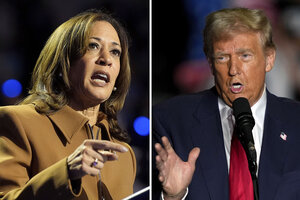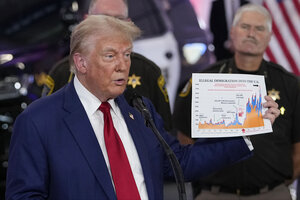Trump documents case: What if there’s no one to investigate presidents?
Loading...
Could the age of the special prosecutor be nearing its end?
In a potentially far-reaching ruling on Monday, a federal judge in Florida dismissed a criminal case seeking to prosecute former President Donald Trump over his alleged retention of classified documents.
The decision by Aileen Cannon, a U.S. District Court judge in southern Florida whom Mr. Trump appointed in 2020, held that the appointment of a special prosecutor to the case by the U.S. Department of Justice was unconstitutional. The special counsel, Jack Smith, said he will appeal the ruling.
Why We Wrote This
A federal judge in Florida has dismissed the Trump documents case, saying the special counsel leading the prosecution has no constitutional power to do so. Where does that leave independent investigations of presidents?
The ruling represents the latest in a string of legal victories for Mr. Trump. It came days after he survived an assassination attempt in Pennsylvania and hours before he officially became the Republican nominee for president. The former president is the subject of four separate criminal prosecutions this year; this is the third to have stalled in recent months.
In the short term, Judge Cannon’s ruling almost guarantees that the classified documents case won’t go to trial before the presidential election in November. But as special prosecutors have come to be relied on in the most politically sensitive and weighty cases, the decision could have broader implications for presidential power and the rule of law.
What exactly happened on Monday?
The ruling came in a case related to allegations that Mr. Trump retained classified documents after leaving office and refused to return them to federal authorities. (The case stems from that infamous raid of his Mar-a-Lago home two years ago.)
Mr. Trump has pleaded not guilty to 40 criminal counts in the case, but the decision this week had nothing to do with the allegations in the federal indictment. It concerned the person who brought the indictment.
In order to avoid an appearance of bias, Attorney General Merrick Garland assigned the case to Mr. Smith, a former Department of Justice prosecutor with experience investigating war crimes and political corruption. This appointment, Mr. Trump’s lawyers argue, was unconstitutional.
Mr. Smith, who is also leading the case against Mr. Trump related to his involvement in the Jan. 6, 2021, attack on the U.S. Capitol, has countered that because he is an “inferior officer” under the Constitution, he can be appointed directly by the executive branch. This is just as a U.S. attorney, who is subject to confirmation by the U.S. Senate, can unilaterally appoint an assistant U.S. attorney.
In a 93-page decision, Judge Cannon disagreed. Because Congress didn’t have appropriate input into Mr. Smith’s appointment, she ruled, it violated both the Appointments Clause and, as it relates to spending, the Appropriations Clause of the Constitution.
The Appointments Clause “gives Congress a considered role in determining the propriety of vesting appointment power for inferior officers,” she wrote. “The Special Counsel’s position effectively usurps that important legislative authority.”
Federal laws and regulations have for decades held that special prosecutors should be appointed in cases in which the impartiality of Justice Department officials could be reasonably questioned, particularly for investigations into the president or a member of his Cabinet. Critics have hit back that these offices carry too much power with too little accountability, but courts have typically rejected constitutional challenges to a special prosecutor’s appointment. Most recently, a federal judge in Delaware rejected a claim from Hunter Biden, President Joe Biden’s son, that the special prosecutor investigating him for federal gun crimes was appointed on unconstitutional grounds.
But Mr. Smith’s appointment was different, wrote Judge Cannon.
“There does appear to be a ‘tradition’ of appointing special-attorney-like figures in moments of political scandal throughout the country’s history,” she wrote. “But very few, if any, of these figures actually resemble the position of Special Counsel Smith.”
For example David Weiss, the special prosecutor in the Hunter Biden case, was serving as a U.S. attorney when he took on the Biden case. Mr. Smith, meanwhile, was working for a criminal court at The Hague, Netherlands, when he took on the cases against Mr. Trump.
“The appointment of private citizens like Mr. Smith – as opposed to already-retained federal employees – appears much closer to the exception than the rule,” said Judge Cannon.
The executive branch’s “growing comfort” in appointing special counsels “in the more recent era,” she added, “has followed an ad hoc pattern with little judicial scrutiny.”
How has the special prosecutor role changed?
Federal special prosecutors have been used since the late 19th century – President Ulysses Grant appointed John Henderson to investigate the Whisky Ring scandal – but they have become increasingly common since Watergate forced the resignation of President Richard Nixon.
Mr. Nixon’s attempts to fire the independent counsel investigating the Watergate scandal led Congress to pass a law outlining how and when special prosecutors can be used. The statute underpinned special prosecutions like the Iran-Contra affair and the Whitewater scandal, to name two high-profile cases. But it came in for criticism from members of both political parties for enabling sprawling and unaccountable investigations at great cost to the taxpayer.
Congress allowed that statute to expire in 1999, at which point the Justice Department implemented regulations governing the use of special prosecutors. The regulations require the attorney general to approve any action a special prosecutor takes, but the attorney general must report to Congress when he blocks a special prosecutor action.
“That was the compromise,” says Barbara McQuade, a former U.S. attorney who teaches at the University of Michigan Law School.
The regulations were “an effort to maintain some independence, but address the concerns of the sprawling, ‘you’ve created a monster’ idea of an independent counsel,” she adds.
Special prosecutors have since become even more common. While there were roughly 20 special prosecutions in two decades under the federal statute, there have been five in the last seven years. Some experts say the regulations have been invaluable in allowing the federal government to faithfully investigate cases the White House may not have wanted pursued, such as investigations into Russian interference in the 2016 election, Jan. 6, and President Biden’s alleged unlawful retention of classified documents.
Special prosecutors “have been used [when] there’s particularly important, salient, politically charged investigations,” says Anthony Michael Kreis, a professor at the Georgia State University College of Law.
“It’s been a really important tool in order to ensure that the Department of Justice’s work is done in a fair and impartial way, without any undue influence from the attorney general,” he adds.
So what happens now? What could this all mean?
Mr. Smith has appealed Judge Cannon’s ruling to the U.S. Court of Appeals for the 11th Circuit. The appeals court has already overruled the judge once in the classified documents case, but this question may not go the same way.
Judicial skepticism of special prosecutors dates back to at least the 1980s. In a 1988 dissent, Justice Antonin Scalia criticized the U.S. Supreme Court for holding that the independent counsel is an “inferior officer” and thus not in violation of the Appointments Clause.
Earlier this month, in a decision holding that Mr. Trump has a degree of presidential immunity from criminal charges brought in the Jan. 6 case, Justice Clarence Thomas echoed those concerns in a concurring opinion.
“I am not sure that any office for the Special Counsel has been ‘established by Law,’ as the Constitution requires,” he wrote. Lower courts, he added, should “answer these essential questions concerning [Mr. Smith’s] appointment.”
Judge Cannon’s decision on Monday quoted the Justice Scalia dissent and the Justice Thomas concurrence. Neither of those opinions is binding law – in fact, no other justice joined either opinion – but courts may now be pushed toward issuing a concrete ruling on the question.
If the role of special prosecutor is curbed, or abolished entirely, the simplest response would be for regular Justice Department prosecutors themselves to take on those politically sensitive cases. But that could be a positive thing for the country, experts say.
The existence of special prosecutors inherently suggests that the Justice Department and its prosecutors are biased, adds Professor McQuade.
“We have to trust them to do their jobs effectively, [that] there are checks in the system,” she says.
But there does need to be a way to hold presidents to account if or when they break the law, experts say, especially in the context of Congress being deeply polarized and the Supreme Court granting former presidents significant immunity from criminal prosecution, says William Howell, director of the Center for Effective Government at the University of Chicago.
“If there’s no special prosecutor, and the president is granted widespread immunity for any official conduct, and Congress is congenitally incapable of mustering the supermajorities required to impeach [and] convict, what’s left?” asks Dr. Howell.
“That’s precisely the question we should be asking,” he adds. “There are widespread concerns about the health and well-being of democracy, and the prospects of holding a president to account are just becoming dimmer and dimmer.”















